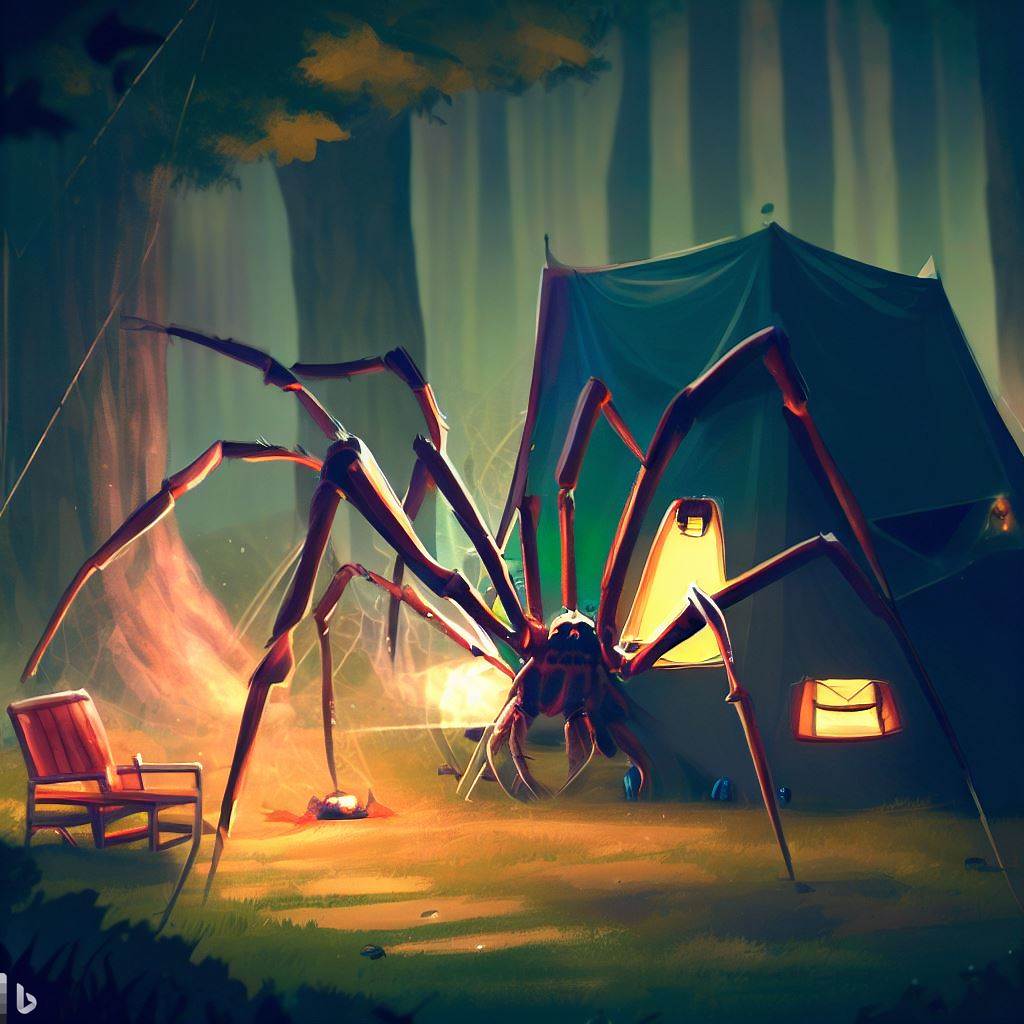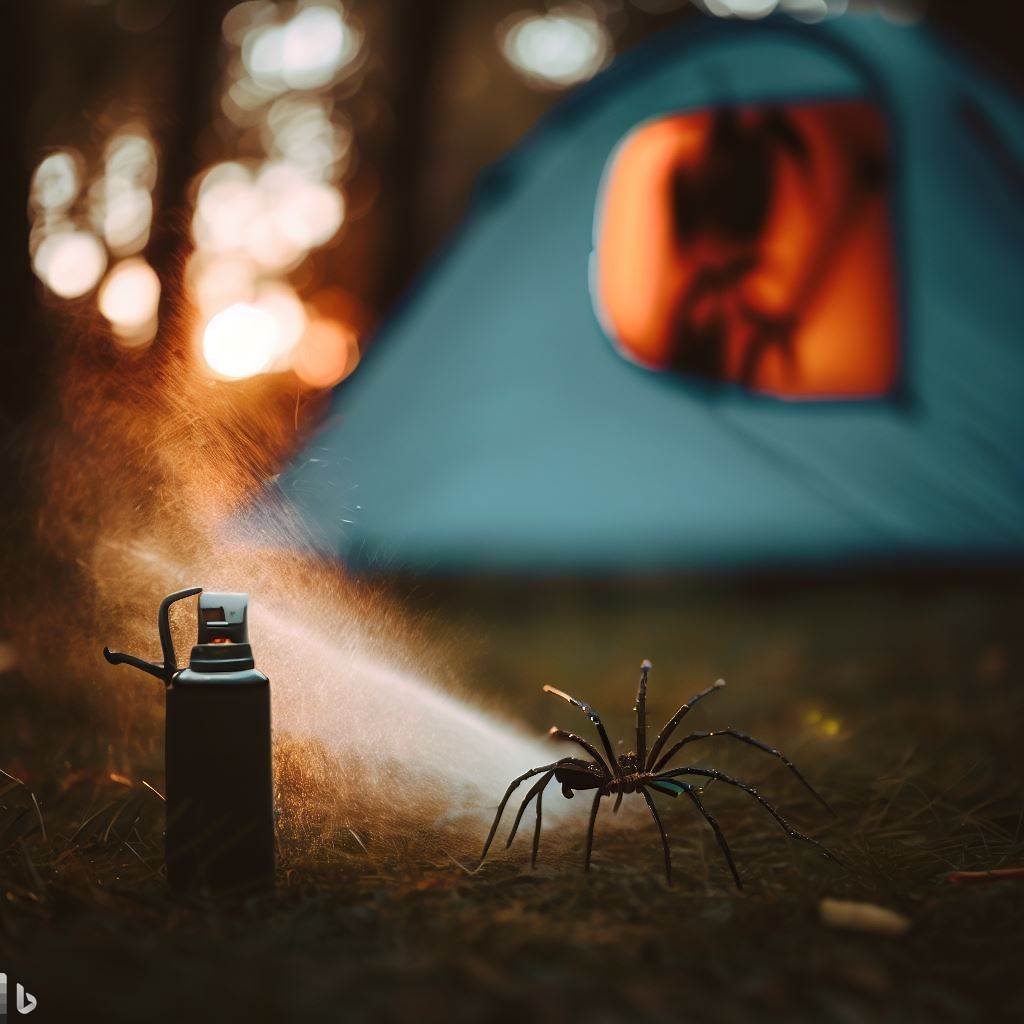Ah! The great outdoors: fresh air, beautiful landscapes, the warmth of a campfire…and spiders. Yes, those eight-legged little creatures can turn an idyllic camping trip into a nightmare for some people. But fear not! We’ve got you covered with the ultimate guide to spider repellents fit for any camping excursion.
So, what will you gain from this article? An arsenal of information on how to keep spiders at bay while you enjoy your s’mores and sing-a-longs around the fire. Now don’t get us wrong—we bear no ill will toward spiders. In fact, we admire their industrious nature and role in the ecosystem; just preferably outside our tent!

We promise that by the end of this article, you’ll feel more like a superhero ready to protect your campsite rather than someone quaking at every rustling leaf or shadowy corner fearing an arachnid invasion. After all who wants their ‘fun under the stars’ marred by eight-legged party crashers?
Here is an article you might be interested in camping with babies hacks
Here is also another exciting article to read can rats have cashews
Types of Camping Spider Repellents
1. Camping Spider Spray
A popular choice among campers, these sprays are specially formulated with ingredients that spiders find repulsive. Simply spray the area around your tent, picnic table, and other campsite spots where spiders tend to lurk.
2. Natural Spider Repellent for Camping
If you prefer a more eco-friendly approach, natural spider repellents are an excellent option. They often contain essential oils such as peppermint or lavender known for deterring spiders naturally.
3. DIY Spider Repellent for Camping
For those who love getting crafty and saving money at the same time, making your own spider repellent is a fantastic idea! With ingredients readily available at home like vinegar or citrus peels, you can create an effective homemade solution.
The Effectiveness of Natural Spider Repellents for Camping
Many people swear by natural spider repellents when it comes to keeping these creepy crawlies at bay during camping trips.
Essential oils like peppermint not only repel spiders but also give off a pleasant scent that makes spending time outdoors even more enjoyable.
However, it’s important to note that natural spider repellents may require more frequent reapplication compared to chemical-based options due to their milder potency. Nevertheless, they provide a safe and environmentally-friendly alternative for those who prioritize sustainability.
Chemical-Based Camping Spider Repellents and Their Impact
Chemical-based spider repellents are designed to deliver fast-acting results. They often contain synthetic ingredients like permethrin, which is highly effective in repelling spiders. These products typically offer long-lasting protection against various insects, including spiders.
While chemical-based repellents can effectively ward off spiders, it’s crucial to use them with caution. Be sure to read and follow the instructions carefully to avoid any adverse effects on yourself or the environment.
Tips on Using Camping Spider Repellent Safely
Prevention is better than cure when it comes to dealing with camping spiders. Here are some safety tips for using camping spider repellents:
1. Make sure you understand how to apply the product correctly before use.
2. Wear protective gloves and goggles while applying chemical-based sprays or solutions.
3. Prevent cross-contamination by not spraying repellents near cooking or dining areas.
4. When not in use, keep camping spider repellents out of reach of children and pets in a cool and dry place.
Homemade Spider Repellents Suitable for Campsites
If you prefer a DIY approach, here are a few homemade spider-repellent recipes suitable for campsites:
1. Citrus Spray Solution:
Combine equal parts water and citrus essential oil (such as lemon or orange) in a spray bottle. Shake well before spraying around your campsite.
2. Vinegar Solution:
Mix one part white vinegar with two parts water in a spray bottle. Spray this mixture around your tent, picnic area, or any spots prone to spider activity at your campsite.
Remember that homemade remedies may require more frequent reapplication and might not be as potent as store-bought options. However, they are typically safe and non-toxic.
Factors to Consider When Choosing a Camping Spider Repellant
When selecting the best camping spider repellent for your needs, keep the following factors in mind:
1. Effectiveness: Look for repellents with proven effectiveness against spiders specifically.
2. Duration of Protection: Consider how long the product will remain effective once applied to ensure it lasts throughout your camping trip.
3. Easy Application: Choose products that are user-friendly and easy to apply without creating a mess or requiring complicated instructions.
4. Portability: If you’re backpacking or have limited space, opt for lightweight and compact repellents that won’t weigh you down.
5. Longevity of Storage: Ensure the product’s shelf life is suitable for your planned camping adventures if you don’t plan on using it immediately or frequently.

Pros and Cons of Commonly Available Campsite Spider Deterrents
1. Camping Spider Spray:
Pros:
- Fast-acting solution
- Wide range of options available
- Suitable for immediate use
Cons:
- May contain synthetic chemicals
- Potentially harmful to the environment
2. Natural Spider Repellent:
Pros:
- Eco-friendly option
- Pleasant scent
- Safe around children and pets
Cons:
- Requires more frequent reapplication
- Less potent compared to chemical-based alternatives
3. DIY Homemade Solutions:
Pros:
- Cost-effective
- Utilizes readily available ingredients
Cons:
- Variable potency depending on the homemade recipe used.
- May require more effort in preparation
Conclusion
With so many options available, choosing the right camping spider repellent can feel overwhelming. Consider the factors that matter most to you, whether it’s effectiveness, environmental impact, or ease of use.
Remember, when it comes to camping spiders and keeping them at bay, prevention is key. By using a reliable spider repellent and following proper precautions, you can ensure a spider-free camping experience filled with only positive outdoor memories!
Read another exciting blog post here can you feed turtles bread
This is the article to read for today can you freeze smoked cheese
FAQs
Q: How can I keep spiders away from my tent?
A: There are a few ways to keep spiders away from your tent. One effective method is to use natural spider repellents. Some scents, such as peppermint or citrus, are known to repel spiders. You can also check your camping gear before setting up your tent to make sure you don’t bring any unwelcome eight-legged guests with you.
Q: What are some natural spider repellents I can use?
A: There are several natural spider repellents you can try. Peppermint oil is a popular option, as spiders dislike its strong scent. You can mix a few drops of peppermint oil with water in a plastic spray bottle and apply it around your tent. Citrus peels, vinegar, and even chestnuts are also known to repel spiders.
Q: How can I keep spiders out of my tent?
A: To keep spiders out of your tent, make sure to keep it clean and free of potential food sources. Store your camping gear properly and avoid leaving food crumbs or scented products inside the tent. Consider using a tent that has mesh windows, as this can help keep bugs and spiders from entering.
Q: Do spiders only come out at night?
A: While spiders are more active at night, they can be present during the day as well. Some species of spiders are nocturnal, meaning they are most active at night, while others are active during the day. Regardless of the time, it’s important to take precautions to keep spiders away from your tent.
Q: Are spiders harmful to humans?
A: While most spiders are harmless to humans, there are a few species that can pose a threat, such as black widows or brown recluses. It’s always a good idea to be aware of the types of spiders in your camping area and take necessary precautions to prevent them from entering your tent.
Q: Can perfume attract spiders?
A: Perfume or scented products can attract insects and spiders, as they may perceive the scent as a potential food source. It’s best to avoid using heavily scented products while camping, especially inside your tent.
Q: What is diatomaceous earth, and can it repel spiders?
A: Diatomaceous earth is a natural substance made from fossilized remains of tiny aquatic organisms. It can be used as a non-toxic and chemical-free method to repel spiders. Diatomaceous earth is abrasive to spiders and can cause damage to their exoskeleton, making it an effective deterrent.
Q: How can I prevent spiders from entering my tent?
A: To prevent spiders from entering your tent, it’s essential to keep your camping area clean and tidy. Avoid keeping items that could attract bugs and spiders near your tent. Keep food sealed and stored properly to minimize the chances of attracting spiders. Check your tent for any openings or tears that spiders could use to enter.
Q: What should I do if I have arachnophobia and want to go camping?
A: If you have arachnophobia, the fear of spiders, going camping may be a challenge. However, there are steps you can take to make your camping experience more comfortable. Choose a camping tent with mesh windows to minimize the chances of spiders entering, and use natural spider repellents to keep them away. Camping with a group can also help alleviate anxiety.
Q: Can spiders be killed with bug spray?
A: Bug sprays can be effective in killing spiders, especially those formulated to target insects and spiders. However, it’s important to use them with caution and follow the instructions on the product. Keep in mind that killing spiders should be a last resort, and prevention methods should be the primary focus.
